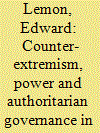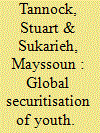| Srl | Item |
| 1 |
ID:
159221


|
|
|
|
|
| Summary/Abstract |
Counter-extremism has become an important tool for the authoritarian government of Tajikistan to consolidate its position. In this article, we argue that counter-extremism is not purely about destructive acts, such as banning groups or arresting individuals: it is productive, too. Using a Foucauldian understanding of disciplinary power and biopower, we argue that counter-extremism in Tajikistan is an attempt to produce secular, docile citizen subjects who are resistant to extremist ideas. Using ethnography and discourse analysis, we focus on the way in which these practices are gendered, targeting the bodies of those deemed ‘dangerous’. Counter-extremism, we argue, is exercised not only by the state but also by citizens, who monitor themselves and others for signs of radicalization. Although some support state secularism, most merely accept it. A smaller group resist practices that target certain forms of religious belief and practice. We explore these everyday forms of resistance against disciplinary power and biopower.
|
|
|
|
|
|
|
|
|
|
|
|
|
|
|
|
| 2 |
ID:
158643


|
|
|
|
|
| Summary/Abstract |
This article looks critically at the new global youth, peace and security agenda, that has been marked by the passage of United Nations Security Council Resolution 2250 in December 2015. It argues that this agenda needs to be situated within the broader context of the securitisation of development, and that the increasing interest in youth as a security subject and actor is shaped by three overlapping sets of global security concerns: the concept of the youth bulge is a euphemism for the problem of growing surplus populations worldwide; the ideal of youth as peacebuilders is a model for eliciting youth support for the current global social and economic order; and the spectre of globally networked youth being radicalised by extremist groups has legitimated joint state and private sector projects that are taking an increasingly active role intervening in the online lives of young people around the world. The article draws on an analysis of a collection of core documents that form the heart of the global youth and security agenda; and it argues for the need for greater critical reflexivity in considering the growing attention being paid to youth as a social category in global development and policy discourse.
|
|
|
|
|
|
|
|
|
|
|
|
|
|
|
|